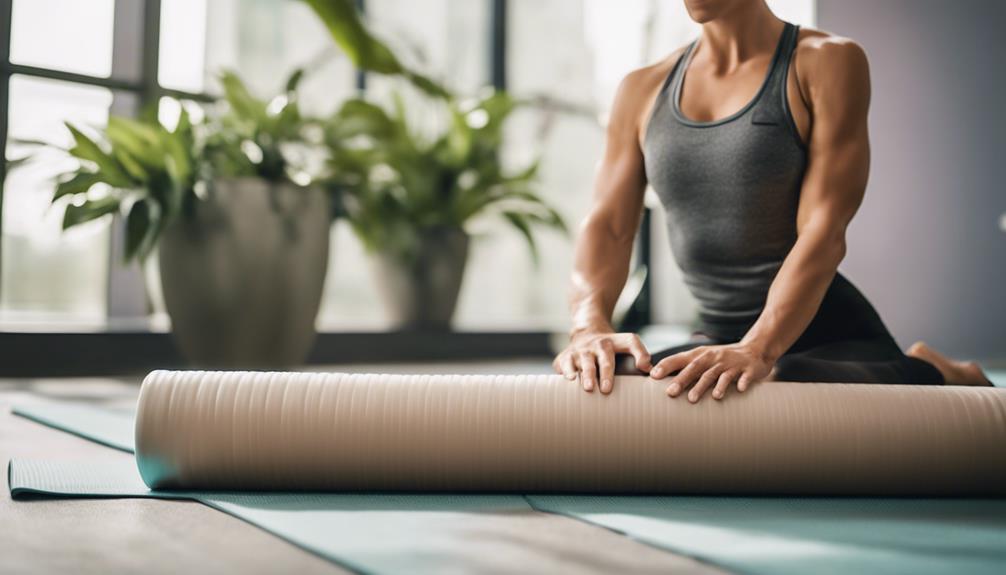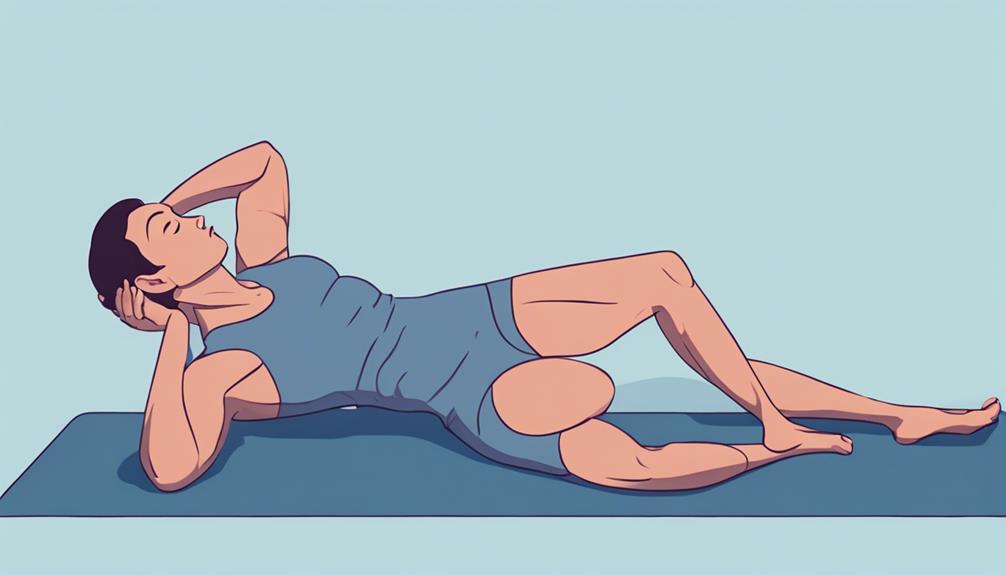To effectively recover from muscle fatigue, prioritize post-workout nutrition and hydrate strategically. Get 7-9 hours of quality sleep nightly and incorporate active recovery techniques like light jogging or swimming. Use foam rolling to boost blood flow and ease muscle tightness. Practice gentle stretching and consider wearing compression garments. Supplement wisely, but consult a healthcare professional first. Listen to your body, adjusting training intensity when needed. Take relaxation breaks for mental recovery, and recognize signs of insufficient recovery like prolonged soreness. By following these tips, you'll optimize your muscle recovery process and enhance your overall fitness journey.
Core Insight
- Prioritize post-workout nutrition with essential amino acids and proper carb-to-protein ratios for optimal muscle recovery.
- Get 7-9 hours of quality sleep nightly and establish a consistent sleep schedule for enhanced recovery.
- Incorporate low-intensity active recovery exercises like light jogging or swimming on rest days.
- Use foam rolling techniques combined with compression sleeves to boost blood flow and ease muscle tightness.
- Listen to your body, adjust training intensity, and take longer rest periods when necessary to prevent overtraining.
Prioritize Post-Workout Nutrition

Eating right after a workout helps your muscles recover. Try to eat within 30 minutes of finishing exercise. This helps your body replace energy stores and fix muscle damage.
Protein is important for recovery. Look for foods with essential amino acids, especially BCAAs. These help your muscles heal best.
Eat both carbs and protein after your workout. Aim for about three times more carbs than protein. Good choices include:
- A banana with Greek yogurt
- A protein shake with fruit
- A turkey sandwich on whole-grain bread
Don't forget to drink water or a sports drink. This replaces fluids you lost while exercising.
Hydrate Strategically

Staying hydrated is important for muscle recovery. You should focus on drinking enough fluids before, during, and after your workouts.
Before you exercise, drink 16-20 ounces of water about two hours ahead of time. During your workout, aim for 7-10 ounces every 10-20 minutes to keep your hydration levels up. After your workout, replace the fluids you lost by drinking 16-24 ounces for every pound you lost through sweat. To enhance hydration and performance, you might want to use hydration powders that include essential electrolytes and vitamins.
Don't limit yourself to plain water. Drinks with electrolytes can help replace the minerals you lose when you sweat. For longer or more intense workouts, consider sports drinks or coconut water. For everyday hydration, try adding fruits or herbs to your water to make it more enjoyable. Remember, staying hydrated is not just about quenching your thirst; it's crucial for your muscles to function well and recover properly.
Get Adequate Sleep

Sleep is essential for muscle recovery. When you sleep, your body produces growth hormones that help repair and build muscles. Try to get 7-9 hours of good sleep each night to make the most of these benefits. Melatonin supplements can help you fall asleep faster and may improve muscle recovery.
To enhance your sleep quality:
- Keep a regular sleep schedule.
- Develop a calming bedtime routine.
- Stay away from screens for at least an hour before bed.
- Make your bedroom cool, dark, and quiet.
If you have trouble sleeping, consider:
- Using blackout curtains or an eye mask.
- Trying white noise or earplugs.
- Investing in a comfortable mattress and pillows.
Incorporate Active Recovery

Active recovery is a great way to help your muscles recover from fatigue. Instead of complete rest, you can engage in low-intensity exercises that increase blood flow to your sore muscles without adding strain. Activities like light jogging, swimming, or cycling are excellent choices. These exercises help remove waste products from your muscles and bring in nutrients, which speeds up recovery.
Using recovery massage products can also support muscle healing. Tools like air compression systems or massage guns can improve blood circulation and ease soreness. They allow you to target specific areas effectively.
To make the most of active recovery, aim for 20-30 minutes of light activity on your rest days. Pay attention to how your body feels and adjust the intensity as needed. It's important not to overdo it; instead, keep a steady, comfortable pace that doesn't worsen muscle soreness. By adding active recovery to your routine, you'll likely experience better flexibility, less muscle stiffness, and quicker recovery between workouts.
Use Foam Rolling Techniques

Have you ever wondered why so many fitness fans love foam rolling? This self-massage technique helps your muscles recover after tough workouts. By pressing on certain spots on your body, you boost blood flow and ease muscle tightness. For even better results, try using compression sleeves along with foam rolling. They can improve circulation and support specific muscle areas.
To use a foam roller the right way:
- Begin with big muscle groups, like your thighs and hamstrings.
- Roll slowly over each area for 30 to 60 seconds.
- If you hit a sore spot, stop and press down for 10 to 15 seconds.
- Take deep breaths and relax your muscles.
- As you get used to it, you can apply more pressure.
This simple routine can help you feel better and recover faster.
Try Contrast Water Therapy

Contrast water therapy is a simple and effective way to help your muscles recover. This method involves moving between hot and cold water, which boosts blood flow and reduces swelling. Start by soaking in warm water for a few minutes, then switch to cold water. Repeat this several times for the best results.
Here's an easy guide to contrast water therapy:
| Water Temperature | Duration | Repetitions |
|---|---|---|
| Warm (38-40°C) | 3-4 min | 3-4 times |
| Cold (10-15°C) | 30-60 sec | 3-4 times |
| Warm (38-40°C) | 3-4 min | End with warm |
You can do this therapy in a shower, bathtub, or with buckets of water. Make sure to finish with warm water to keep your muscles relaxed. Pay attention to how you feel and adjust the temperatures and times to suit your comfort.
Practice Gentle Stretching

Gentle stretching is important for recovering from muscle fatigue. It helps increase blood flow to tired muscles, reduces stiffness, and improves flexibility. To stretch effectively, begin with a light warm-up to raise your body temperature. Focus on the muscle groups you've worked out, holding each stretch for 15-30 seconds. Remember not to bounce or jerk during your stretches.
You can also use foam rollers to help relieve muscle tightness and improve flexibility. These tools can provide deeper relief and target specific muscles more effectively.
As you stretch, breathe deeply and slowly. Do not push yourself too hard; you should feel a mild tension, not pain. Gradually increase how intensely you stretch as your muscles relax. The best time to stretch is after your workout or during your cool-down. If you still feel sore the next day, light stretching can help ease discomfort. Always listen to your body and stop if you feel any sharp pain.
Consider Compression Garments

Compression garments are a great way to help your muscles recover after exercise. These tight-fitting clothes can reduce soreness and improve blood flow. You can find different types, like sleeves, socks, and full-body suits. When picking compression gear, keep these points in mind:
| Factor | Importance |
|---|---|
| Fit | Should be snug, but not too tight |
| Material | Needs to be breathable and moisture-wicking |
| Pressure | Look for graduated compression for the best results |
Wearing compression garments during or after your workout can enhance their effectiveness. They are especially helpful for activities that involve a lot of movement or impact. You may notice less muscle movement and better body awareness when you wear them. After exercising, it's a good idea to keep the garments on for a few hours to support recovery. Just remember, while compression gear can help, it's important to also focus on proper rest and nutrition for your recovery.
Supplement Wisely

Certain supplements can be helpful for muscle recovery, but it's important to use them wisely. Focus on supplements that have scientific support for their effectiveness. For example, protein powders, especially whey, can aid in repairing and building muscle tissue. When choosing a protein powder, look for options that offer a complete amino acid profile and contain 20-30g of protein per serving.
Branched-chain amino acids (BCAAs) can also help reduce muscle soreness and fatigue. Creatine monohydrate is another supplement that can boost muscle strength and recovery.
Don't overlook essential vitamins and minerals. Vitamin D is important for muscle function, while magnesium helps with muscle relaxation. Omega-3 fatty acids can reduce inflammation. However, keep in mind that supplements should not replace a balanced diet.
Always talk to a healthcare professional before starting any new supplements, especially if you have health conditions or take medications. Start with smaller doses and pay attention to how your body responds to avoid any negative effects.
Listen to Your Body

Listen to Your Body
Supplements can help you recover, but your body knows best. Pay attention to how you feel during and after your workouts. If you notice ongoing soreness, tiredness, or that you're not performing as well, it's time to change things up. Ignoring these signs can lead to overtraining and injuries.
| Signal | Meaning | Action |
|---|---|---|
| Prolonged soreness | Not enough recovery | Take a longer rest |
| Decreased performance | Too much fatigue | Lower your training intensity |
| Persistent exhaustion | Risk of overtraining | Take a week to recover |
Also, listen to your body when it comes to sleep. If you struggle to fall asleep or wake up often, you may need more time to recover. Good sleep is crucial for muscle repair and overall recovery. Remember, recovery isn't just about resting your body; your mind needs a break too. Make time for relaxation and take breaks when you need them to help your body recover better.
Frequently Asked Questions
How Long Does Muscle Fatigue Typically Last?
Ever pushed yourself too hard at the gym? Muscle fatigue typically lasts 24-72 hours. You'll notice improvements within a day or two, but full recovery can take up to three days, depending on workout intensity and your fitness level.
Can Certain Medications Affect Muscle Recovery Time?
Yes, certain medications can affect your muscle recovery time. You'll find that some drugs, like statins or corticosteroids, may slow down recovery. On the other hand, anti-inflammatory medications might speed up the process. Always consult your doctor for personalized advice.
Are There Specific Vitamins or Minerals That Help Reduce Muscle Fatigue?
As they say, "You are what you eat." You'll find that vitamins B, C, D, and E, along with minerals like magnesium, potassium, and iron, can help reduce muscle fatigue. They're essential for energy production and muscle function.
Does Age Impact Muscle Recovery Rates?
Yes, age impacts your muscle recovery rates. As you get older, you'll notice slower recovery times. Your body's ability to repair and rebuild muscle tissue decreases, so you'll need more rest between workouts to fully recuperate.
Can Stress or Anxiety Influence Muscle Fatigue and Recovery?
Can stress or anxiety affect your muscles? You bet! They'll tighten your body, increase tension, and slow recovery. Your mental state directly impacts physical well-being. Manage stress to help your muscles bounce back faster and feel better overall.

